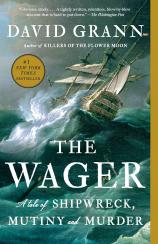The Wager: A Tale of Shipwreck, Mutiny and Murder
Review
The Wager: A Tale of Shipwreck, Mutiny and Murder
At one point in THE WAGER, David Grann’s masterful account of an 18th-century shipwreck, the castaways are visited by a delegation of nomadic indigenous people who ply the waters and the islands of southern Chile. The members of the Kawésqar tribe, Grann explains, have managed over the course of generations to adapt themselves perfectly to their surroundings. They go from island to island looking for food. Their canoes are large enough to carry their families (and to keep a fire burning aboard) but are shallow enough to allow them to travel over the treacherous reef. The Kawésqar find themselves astonished that the English sailors have no idea how to stay alive in a territory that is not only familiar to them but is home.
"Through a combination of bad navigation, bad luck and bad leadership, the Wager comes to its destruction on an inhospitable island at the far end of nowhere. What Grann does best is to describe just how the iron discipline inherent in the Royal Navy crashed and splintered just as the hull of the ship did."
The irony here is that the men who manned His Majesty’s Ship the Wager and sailed her to her doom after a disastrous “around the Horn” voyage skirting the southern tip of South America were, in their own way, perfectly adapted to their own wooden world. The average sailor on a Royal Navy ship at the time had to adapt himself to a punishing environment --- a day filled with routine tasks, many of which could kill you if you were unwary or unlucky; short commons, especially with regard to fresh food, which eventually resulted in scurvy; and subjugation to the law of the sea, enforced by a captain with Godlike power and all-too-human discretion.
The story of the Wager is the story of adaptation --- how a ship’s crew that was adequate to deal with the regular sort of nautical tasks was asked to sail into one of the most unforgiving environments in the world. The Royal Navy, fighting in the ridiculously named War of Jenkins’ Ear, had sent a task force to cripple the Spanish war effort by capturing a treasure galleon in the South Pacific. In order to accomplish this, the Wager and the other members of her little armada had to brave the extreme wind and raging seas off Cape Horn. Grann notes with relish the various hardships and travails of the intrepid mariners, whose wooden world is beset with tempests.
Through a combination of bad navigation, bad luck and bad leadership, the Wager comes to its destruction on an inhospitable island at the far end of nowhere. What Grann does best is to describe just how the iron discipline inherent in the Royal Navy crashed and splintered just as the hull of the ship did. There is an extent to which, in a happy or an unhappy ship, the personalities of the individual officers are not that important. The crew may not like the captain or the lieutenants, and may seethe under them, but it takes a cataclysm like the destruction of the ship for discipline to disintegrate.
Grann takes a somewhat detached, even-handed approach to the study of the mutiny that developed. The brave and dutiful Captain David Cheap struggles to hold his men together, hoping against hope that he can rejoin the squadron and somehow complete his mission. The aristocratic midshipman John Byron, the poet’s grandfather, seeks to navigate his own path. The pious gunner John Bulkeley leads what you could call the competence caucus --- the professional, stoic mariners for whom the only path forward is the one that leads home.
The ad campaign for THE WAGER makes frequent references to Patrick O’Brian. Even though O’Brian’s heroes not infrequently find themselves shipwrecked in the odd corners of the world, the comparison is unfair. No one aboard the Wager had the bottomless self-confidence of Jack Aubrey or the scientific mind of Stephen Maturin; if they had, things would be very different. The story that Grann tells is one of survival and adaptability, and what people can and will do in extreme situations. It’s possible that no one has been through an ordeal as severe as those suffered by the crew of the Wager --- which many, of course, did not survive. What Grann has done is to pull the story of these men out of the depths of history and bring it to dramatic life.
Reviewed by Curtis Edmonds on April 21, 2023
The Wager: A Tale of Shipwreck, Mutiny and Murder
- Publication Date: February 25, 2025
- Genres: History, Nonfiction, True Crime
- Paperback: 432 pages
- Publisher: Vintage
- ISBN-10: 0307742490
- ISBN-13: 9780307742490




